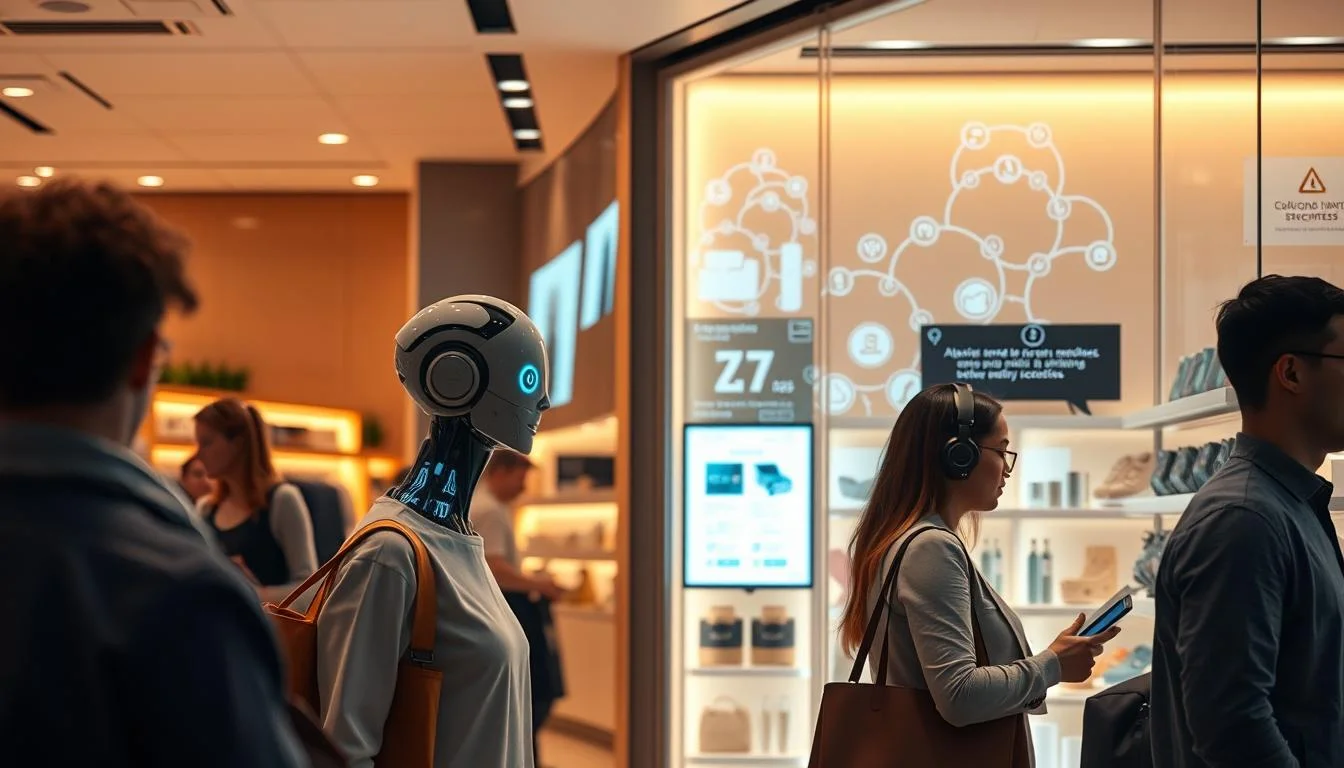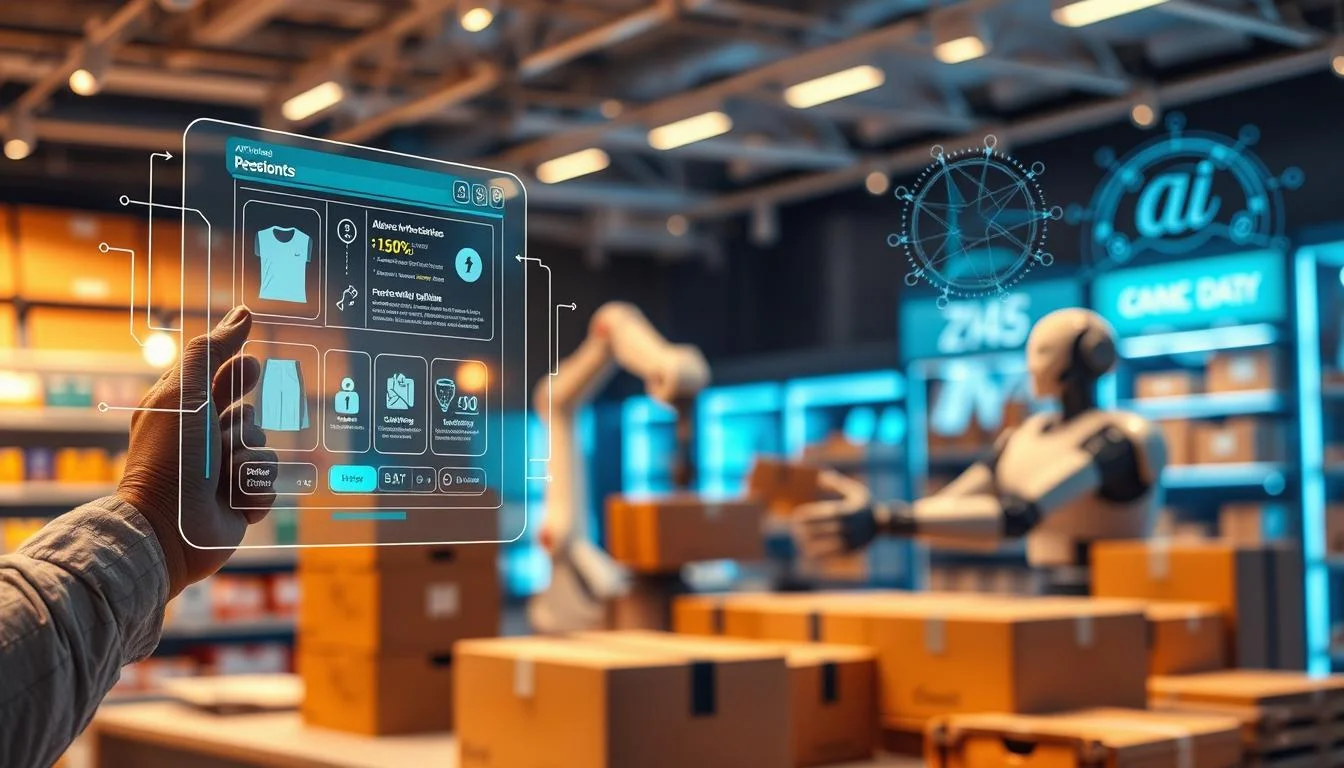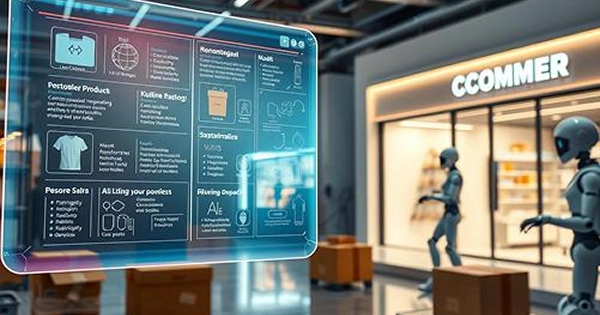The ecommerce industry is undergoing a significant revolution, driven by the integration of artificial intelligence into online shopping platforms. AI in ecommerce is not just a trend; it’s a transformative force that’s changing how businesses operate and interact with customers.
Key Takeaways
- AI enhances customer experiences through personalization.
- E-commerce businesses use AI for operational efficiency and growth.
- AI is revolutionizing the online shopping landscape.
- Companies are adopting AI to remain competitive in a crowded market.
- E-commerce transformation is largely fueled by AI integration.
The Current State of AI in E-commerce
AI’s role in e-commerce has evolved dramatically from simple automation to advanced intelligent systems. Businesses are compelled to innovate continually to keep pace with rapidly shifting consumer expectations.
From Basic Automation to Intelligent Systems
The journey started with basic automations like inventory tracking and simple chatbots. Today, it has grown into sophisticated applications such as predictive analytics and hyper-personalized experiences. For instance, AI-powered chatbots now handle up to 80% of customer inquiries, reducing workload on human agents and improving response times.
Market Impact and Statistics
- The global AI in e-commerce market is projected to reach $22.1 billion by 2025.
- Over 70% of e-commerce businesses are expected to adopt AI-powered solutions.
- Personalization driven by AI can boost sales by up to 20-30%.

10 Ways AI is Transforming E-commerce
AI is creating a profound shift across many aspects of e-commerce:
1. Personalized Shopping Experiences
AI algorithms analyze customer data like browsing patterns and purchase histories to deliver tailored product recommendations. A study by McKinsey shows personalized experiences can lift sales by 30%.
Example:
- Amazon’s Recommendation Engine analyzes vast data to suggest products, driving a significant portion of their revenue.
2. Chatbots & Virtual Shopping Assistants
AI chatbots offer 24/7 support, handling FAQs, order tracking, and product queries, freeing human agents to tackle complex issues. They also enable conversational commerce, providing personalized buying assistance directly in chat.
3. Visual Search Technology
Visual search lets customers upload images to find similar products. AI-powered recognition matches patterns and features, making it easier for shoppers to discover items they might not know how to describe.
Success Stories:
- Pinterest’s Lens helps users find products from photos.
- ASOS uses visual search to let customers shop by snapping a picture.
4. Intelligent Inventory Management
AI forecasts demand using historical sales, seasonality, and external factors like weather. This reduces stockouts or overstocking, optimizing warehouse operations and cutting costs.
- Machine learning improves demand prediction accuracy.
- Automated restocking systems maintain optimal inventory levels.
5. Fraud Detection & Prevention
AI protects e-commerce businesses by analyzing transaction patterns to detect anomalies. These systems balance security and user experience by reducing false positives, protecting genuine customers from unnecessary friction.

6. Dynamic Pricing Optimization
AI monitors market trends, competitor pricing, and customer behaviors to adjust prices in real-time. This allows businesses to maximize revenue while staying competitive.
- Algorithms predict demand elasticity and adjust pricing instantly.
7. Predictive Customer Behavior Analysis
AI models can:
- Anticipate purchase decisions, sending timely promotions.
- Reduce cart abandonment by identifying patterns and triggering reminders.
- Predict customer lifetime value, enabling smarter loyalty investments.
8. Voice Commerce Integration
Smart speakers and voice assistants like Alexa and Google Assistant are changing shopping habits. AI allows hands-free shopping, quick reorders, and personalized recommendations.
To capture this, businesses optimize product catalogs for voice search, using natural language and conversational keywords.
9. Augmented Reality (AR) Shopping Experiences
AR enables virtual try-before-you-buy, letting customers see how products look on them or in their space.
- Sephora and L’Oréal use AR for virtual makeup trials, boosting confidence and cutting return rates by up to 40%.
10. AI-Powered Marketing Automation
AI personalizes email and ad campaigns, generates product descriptions, and optimizes marketing across channels. This means more targeted content, higher engagement, and improved ROI.
Your Store Deserves an AI Upgrade
Turn visitors into loyal customers with smarter insights and personalized shopping journeys.
Challenges and Limitations of AI in E-commerce
- Data privacy & ethics: Handling vast customer data responsibly is crucial to maintain trust and comply with regulations.
- Implementation costs: AI adoption often demands investment in infrastructure and skilled talent.
- Legacy integration: Older systems can be tough to integrate with new AI platforms.
Overcoming these barriers is key for businesses looking to maximize AI’s benefits.
Future Trends in AI-Powered E-commerce
Emerging innovations include:
- Multimodal AI: Combining text, image, and voice interactions.
- Edge AI: Processing data closer to the source, enhancing speed for personalized experiences.
Preparing involves investing in robust data infrastructure, upskilling teams, and fostering a culture open to innovation.
Conclusion: How Equitysoft Technologies Can Help
As we’ve seen, AI is not just enhancing e-commerce it’s redefining it. From hyper-personalization to predictive analytics, businesses that embrace AI will lead the next era of online retail.
At Equitysoft Technologies, we specialize in building AI-powered web, mobile, and enterprise solutions that help e-commerce businesses thrive in this rapidly evolving landscape. Whether it’s integrating advanced chatbots, building smart recommendation engines, or creating seamless shopping experiences, we’re here to drive your digital success.
🚀 Looking to transform your e-commerce platform with AI?
Let’s connect and explore how we can elevate your business together.
Frequently Asked Questions
Get answers to common questions about AI in eCommerce







